 Thanks to advances like CRISPR gene editing, artificial intelligence, and genetic sequencing, microbes have turned into teeny-tiny superheroes with the power to address the world's most pressing challenges: producing sustainable energy, ending hunger, minimizing waste, and mitigating climate change. This feature article on the growing bioeconomy, which anchors a special issue of UC Berkeley's Breakthroughs magazine, spotlights Rausser College faculty and alumni in the center of the action. While they are focused on the sector's enormous potential, they caution that just because we can, doesn't mean we should. What’s key, Coates says, is creating circular, sustainable systems that take carbon out of the atmosphere, then put it back into products and services, all without the planet-harming impacts of fossil fuels. “We can still have a bioeconomy that’s not sustainable,” he cautions. For example, he says, ethanol-dedicated cornfields require carbon-intensive farming inputs—tilling, fertilizing, irrigating—and use land and resources that could be used for food crops. Many analyses find this practice cancels out ethanol’s carbon benefits and creates waste-disposal issues and food versus fuel land-use concerns. “Sometimes the technology is not the important thing,” Coates says. “It’s the entire lifecycle.” Read more. Comments are closed.
|
Fresh Ink! is a blog showcasing recent work by Ann Brody Guy, an Oakland-based freelance writer-editor covering science, health, and higher educationCategories |
 RSS Feed
RSS Feed